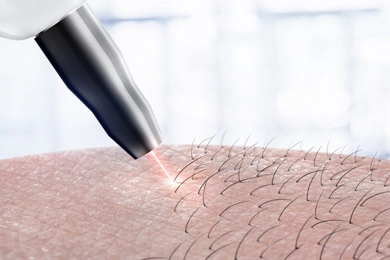
Two popular techniques—Laser Hair Removal and Electrolysis—have emerged as front-runners in the race for smooth, hair-free skin. Both are well-liked and efficient, but they are distinctly different. This thorough guide seeks to emphasize the key distinctions and advantages of each approach, assisting you in making an informed choice if you're torn between the two.
Laser hair removal: This method uses focused light beams (lasers) to destroy hair follicle melanin (pigment). The heat produced when the light is absorbed by the melanin damages the hair follicles and prevents or delays the creation of new hair.
In electrolysis, the growth center of the hair follicle is destroyed by an electric current delivered by a microscopic probe into the hair follicle. This technique focuses on removing individual hairs in order to accomplish permanent hair removal.
Due to the dramatic contrast that makes it simpler for the laser to target melanin, laser hair removal has historically been most effective on people with light skin and dark hair. But modern advances in laser technology also provide treatments for people with darker skin tones.
Electrolysis is popular worldwide since it works on all skin and hair types, colors, and regions. Electrolysis doesn't care if you have light hair and dark complexion or the opposite.
Laser Hair Removal: Depending on the treatment area, laser treatments can range anywhere from a few minutes to an hour. Patients usually require 4–8 treatments spaced 4-6 weeks apart.
Electrolysis: To have long-lasting benefits, you'll need a lot of sessions spread out over several months, ranging in length from 15 minutes to an hour. Since it only targets individual hairs, it is a slower approach.
Laser hair removal is said to feel like a rubber band snapping against the skin. The majority of contemporary lasers use cooling systems to reduce pain.
Electrolysis: Feelings might range from a small pinch to a stinging sensation. Numbing creams can be used to reduce any discomfort, though some people find it to be more uncomfortable than lasers.
Due to its capacity to target numerous follicles simultaneously, laser hair removal is most effective on bigger areas like the back, legs, and arms.
Electrolysis: Due to its accuracy, it is ideal for smaller areas like the chin, upper lip, and eyebrows. It can be applied to any part of the body, though.
Instead of removing all hair, laser hair removal offers permanent hair reduction. Over time, some maintenance sessions can be necessary.
Only electrolysis is an FDA-approved permanent hair removal procedure. The effects are typically persistent after several sessions.
Temporary side effects of laser hair removal include soreness, edema, and redness. If the procedure isn't catered to the patient's skin type, there is a tiny possibility of burns or skin discoloration.
Redness and swelling are two minor side effects of electrolysis that are frequently experienced. Inaccurate procedures increase the chance of infection or scarring.
Laser hair removal is typically more expensive up front, but since fewer treatments are required over time, it can end up being more affordable.
Electrolysis: Could be more economical each session, but the required volume of sessions could quickly mount up.
Electrolysis and laser hair removal each offer specific benefits. Your decision should be determined by your budget, desired results, pain threshold, and skin and hair types. It's critical to seek advice from seasoned experts to determine which approach best fits your objectives. While both techniques provide an alternative to routine shaving or waxing, being aware of the differences between them can help you choose a path that will give you the most happiness.
 Everything About Male Laser Hair Removal
Everything About Male Laser Hair RemovalIn recent times, men who are looking for a long-term solution to undesirable body hair have grown more and more interested in laser hair removal. ...
 Differences Between Electrolysis and Laser Hair Removal
Differences Between Electrolysis and Laser Hair RemovalWhen considering permanent hair removal solutions, two methods dominate the industry: electrolysis and laser hair removal. ...
 What Factors Affect Laser Hair Removal Prices?
What Factors Affect Laser Hair Removal Prices?The cost of treatment of laser hair removal may increase for clinics located in affluent or cosmopolitan areas due to higher operational expenses such as rent, utilities, and salaries. ...
 Acne After Laser Hair Removal And Its Treatment
Acne After Laser Hair Removal And Its TreatmentUnwanted hair can be removed from various parts of the body using the popular and efficient laser hair removal procedure. It provides a long-lasting method to stop hair growth, leaving skin that is smooth an ...
 Medications You Should Avoid While Receiving Laser Hair Removal
Medications You Should Avoid While Receiving Laser Hair RemovalUsing a laser to eliminate unwanted body hair is a common cosmetic technique known as laser hair removal. Many people elect to undergo laser hair removal in order to obtain a smoother, hair-free appearance b ...